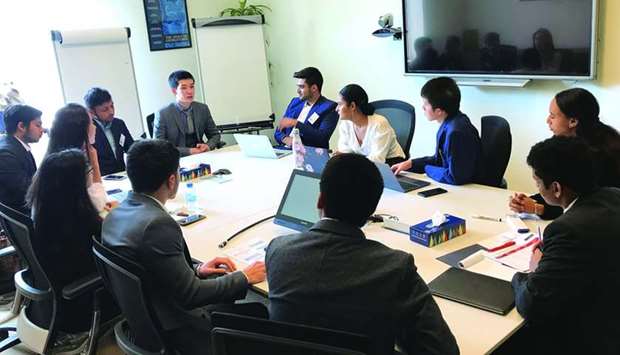A total of 28 students at Georgetown University in Qatar (GU-Q) sought to resolve a major international conflict- a simulated one- at the recent international negotiation and crisis simulation exercise that takes place every year in collaboration with Georgetown University’s Institute for the Study of Diplomacy (ISD) in Washington, DC.
Based on real events but set in the future with hypothetical developments, the scenario for the simulation revolved around the Iran Nuclear crisis, and required the students to represent different countries involved in the negotiations.
The simulation is part of GU-Q’s International Negotiation Lab course for students of international affairs. Three workshops introduced students to the workings of a simulation, taught negotiation skills, and provided a subject matter briefing on the crisis. Then students were divided into teams representing China, France, Germany, Iran, Russia, the United Kingdom, and the United States. They were also provided substantive briefings on the current crisis and explanations of the underlying political dynamics.
Course organiser, assistant dean for academic affairs at GU-Q, Dr Christine Schiwietz, stressed the importance of understanding international diplomacy through hands-on experience, not only through classroom learning. “Experiential learning through the Crisis Simulation, which is a credit-bearing course, is an integral component of the Georgetown curriculum. It challenges students to apply what they’ve learned in the classroom to the real world, which helps them connect theory and practice.”
Participating student Maryam al-Thani, a Culture and Politics major, said, “I think what is essential about simulations is that they allow you to delve deeper and further examine the dynamics of a negotiation process. They really establish the importance of mediators and multilateral negotiations as a means to ameliorate rising tensions.”
Beyond the lessons in crisis negotiation, the workshops also focused on the science of weapons of mass destruction.
For Amna Falah, a senior majoring in International Economics who took part as a member of the UK team, connecting an understanding of nuclear technologies to diplomatic negotiations was an important development in this year’s simulation. “The Iran issue is very current and always developing. Not only did we get the opportunity to learn about the political aspect of the conflict, but also the scientific side of it,” she added.
The simulation is part of GU-Q’s International Negotiation Lab course for students of international affairs. Three workshops introduced students to the workings of a simulation, taught negotiation skills, and provided a subject matter briefing on the crisis. Then students were divided into teams representing China, France, Germany, Iran, Russia, the United Kingdom, and the United States. They were also provided substantive briefings on the current crisis and explanations of the underlying political dynamics.
Course organiser, assistant dean for academic affairs at GU-Q, Dr Christine Schiwietz, stressed the importance of understanding international diplomacy through hands-on experience, not only through classroom learning. “Experiential learning through the Crisis Simulation, which is a credit-bearing course, is an integral component of the Georgetown curriculum. It challenges students to apply what they’ve learned in the classroom to the real world, which helps them connect theory and practice.”
Participating student Maryam al-Thani, a Culture and Politics major, said, “I think what is essential about simulations is that they allow you to delve deeper and further examine the dynamics of a negotiation process. They really establish the importance of mediators and multilateral negotiations as a means to ameliorate rising tensions.”
Beyond the lessons in crisis negotiation, the workshops also focused on the science of weapons of mass destruction.
For Amna Falah, a senior majoring in International Economics who took part as a member of the UK team, connecting an understanding of nuclear technologies to diplomatic negotiations was an important development in this year’s simulation. “The Iran issue is very current and always developing. Not only did we get the opportunity to learn about the political aspect of the conflict, but also the scientific side of it,” she added.

